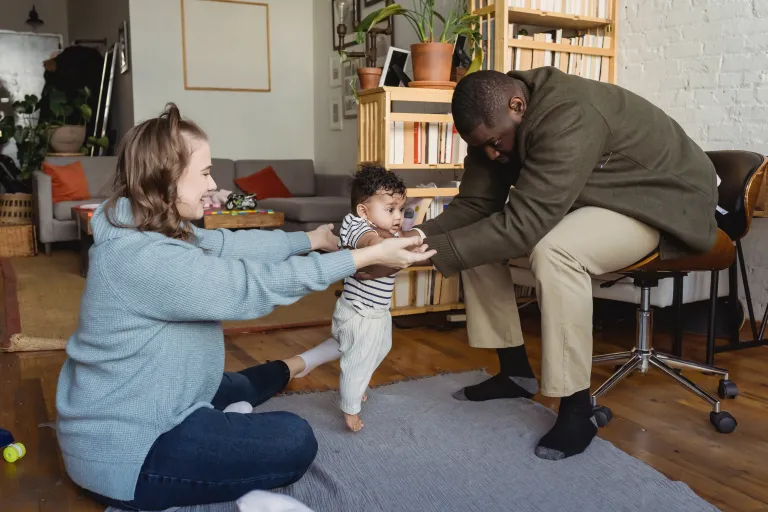
So much of the experience of learning to co-parent with your partner is wonderful. In many ways, it’s a great opportunity to get to know each other better and to grow closer as you learn to negotiate and face the challenges that having a child together can pose. But it’s no secret that it can also be very tough, especially if you are also navigating financial difficulties, poor mental health, or other issues that have an impact on family life and harmony.
For many people, being a new parent is a huge challenge. Social media can distort our understanding of what it means to be a 'good' parent, and it's easy to be bombarded with images of 'perfect' families enjoying expensive days out and always smiling. Whilst spending time together as a family is important, it isn't always easy. Relationships change when you have a baby. Having children with your partner usually means finding things out about them - about who they are as a parent - that you weren’t entirely familiar with before. It can mean discovering areas of disagreement, or even incompatibility. And, of course, there are all the practical sides: the pressure on finances, time, energy, and intimacy.
There’s no way to guarantee that this will be a simple transition for you and your partner - in fact, in all likelihood, it won’t be. But there are certain skills that you can learn, to make it more manageable. This will allow you to face the challenges of parenting together, rather than as individuals, allowing you to swerve around some of the potholes that so many couples find themselves falling into.
Having a team mindset
As with many examples of good practice, one of the best ways to co-parent is by first assuming the ‘mindset’. And this mindset is - simply put - thinking of yourself and your partner as being on the same team. So many of the problems that new parents face come because of the couple finding it increasingly difficult to work together as a team. It can happen also to couples who have been parents for a while.
One of the surprises about parenting is that it can reveal things about your partner that you just weren’t familiar with. Very often, we end up repeating the scripts that we learned when we were children. We may try - consciously or unconsciously - to replicate (or move in the opposite direction from) the things that we experienced decades ago. These can be big things or small: from teaching our children certain values to having specific ideas about food or holidays.
Discovering these differences can cause friction. It can be disappointing and confusing to realise that someone you thought you knew well actually has all kinds of ideas that don’t chime with your own. Many parents find themselves not working as collaborators but as competitors: one telling the children one thing, and the other parent telling them another. If you’re not careful, over time this can become overt, with each parent actively trying to undermine the other. For the children, this can be confusing and potentially damaging. At best, children play you off against each other. At worst, they struggle with their own emotional regulation, relationships, and understanding of what's expected at home.
It’s important to set out a philosophy of teamwork from the beginning. Even if you discover things about each other that you weren’t expecting, that doesn’t have to mean you pull away from one another. Instead, it can be an opportunity to confront and discuss these differences.
Learning to compromise - and let go of some of your expectations
Your communication skills are likely to be very much tested by becoming a new parent. We always recommend that people attempt to develop their ability to talk to one another throughout their relationship. So many problems can be addressed by learning to have difficult conversations: by developing the ability to express contentious points sensitively and not react defensively when challenged. If you’d like to read more on how to head off arguments before they happen, take a look at our article on the topic.
A big part of this process of negotiation is learning to compromise. This differs slightly from resolving an issue, in that it doesn’t necessarily mean that both parties come out of the discussion with the result they wanted. Although it may sound a little pessimistic, it can be healthy to go into the experience of co-parenting with the expectation that there will be some discussions that you and your partner will finish without either of you feeling fully satisfied. There are some topics on which you just believe different things. And while that can be frustrating, it doesn’t mean it has to be a really big problem. Sometimes, the solution is not to agree, but to disagree productively. We know that parental conflict that is frequent, intense, and poorly resolved is what negatively impacts children. Healthy conflict is where disagreements create constructive discussions rather than shouting matches, slamming doors, or hostile silences.
That’s where compromise comes in. If your partner really wants to take the family camping regularly and you absolutely hate doing this (and perhaps assumed your partner did too until you had children and discovered it’s what they did with their parents every weekend), you may have to be open to the possibility that, once in a while, you’ll be coming along on a camping trip that you don’t particularly enjoy. Likewise, if you think the children will need new clothes quite regularly and your partner believes quite strongly that it’s better to repair what you already own, you may need to compromise on doing things halfway between yours and theirs. These may seem like slightly trivial examples, but these kinds of things often don’t feel trivial - they might feel like they’re pointing to differences in what you each believe. It’s important to be able to reckon with these kinds of disagreements in a way that puts the relationship first, not just your individual needs.
Dividing the work fairly
In any parenting situation, there’s going to be a division of labour. Either each parent ends up doing a certain set of tasks and the other another, tasks are shared equally, or things end up somewhere in between. Division of household labour is one of the issues parents argue most frequently about when they live together.
While it makes sense that each parent carries out duties according to what they’re able to do, this division can also be a real source of tension in relationships. That’s because we often assign or take up these roles based on arbitrary or automatic reasoning. Commonly, we also take up roles that are gender normative.
For example, one parent might be given more of the housework to do because they always have done more of the housework. One person may always end up doing jobs that involve organising things because they are a bit more organised.
The problem with arranging duties like this is that one person may end up feeling they do more work than the other - or at least more of the unpleasant, tiring work. It’s much better to be mindful when you’re doling out these duties - actually talking things through and thinking about what would be fair. Even if someone is good at something, should they be expected to do it all the time? And just because someone has been doing something for a while, should they be expected to continue?
You may find you’ve got slightly different ideas on what adds up to an equal amount of work - and that’s okay. That’s where negotiating - talking productively - and, if necessary, finding ways to compromise, can come in. It’s better to try to have these conversations early on, even if they can feel uncomfortable than leave one person feeling short-changed and resentful over time. It's also helpful to remember that just because one parent is at home with the children, it doesn't mean they aren't working. Often they are the ones that are doing the bulk of the cleaning, cooking, and day-to-day chores, as well as getting up in the night and taking care of the children. It can be useful to think about 'work' in terms of paid and unpaid for this purpose so that the division of labour is fair.
Keep talking
This skill is as important - if not more - than any of the above. Addressing an issue once is good, but if you really want to be able to keep working together effectively, then it’s important to get into the habit of talking.
Talking regularly should be a skill that you and your partner try to develop together, long term. If you’re able to make discussing things that are making you feel angry or sad or worried a regular, normal thing, then you’re much more likely to be able to deal with any new problems as they come up, rather than getting stuck in the cycle of feeling frustrated about something, but not being able to address it.
This is particularly relevant when it comes to co-parenting because the challenges of being a parent change regularly over time. The challenges that you face together when you have a baby aren’t going to be the same ones you face when you have a toddler. And the challenges you face when you have a teenager are going to be different still. It’s by being able to come back together and talk about (and listen to) what’s going on - the big stuff and the little stuff - that you’ll be able to adapt as a team.
How we can help
One Session Therapy is a solution focused, one off appointment, which can help you navigate through these feelings, process what has happened and discuss how to move forward from an argument that keeps coming up, either in your own time or with further Therapy.
Finding ways to communicate after a lot of arguments or disagreements takes time. One Session Therapy equips you with tools to communicate effectively, set boundaries, and work towards understanding eachother, either on your own, or with your coparent.
Ready to move forward and take steps to make coparenting decisions together? Book a One Session Therapy session with us to speak with a counsellor at a time that works for you and take the first step in resolving the problem you’re facing.
How you can help
Have you found this advice helpful? Make a donation to help us reach more people and continue supporting the nation’s relationships:
Can't afford to donate? We understand. Instead, we ask that you leave us a 5 star review on Trustpilot.
